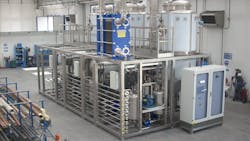Circular Economy
In recent decades, the rapid growth of the population has led to a substantial increase in the use of natural resources, resulting in overexploitation and, in some cases, scarcity of certain raw materials.
In response to this challenge, the circular economy emerges as an alternative production model that promotes a more responsible use of natural resources.
The goal is to design sustainable production systems from the outset, preserving the value of resources and products. This involves reducing excessive consumption of raw materials and energy while encouraging recycling and waste reuse whenever possible.
The circular economy is critical for several reasons:
- Reduces waste and pollution
- Extends the life of materials, reducing demand for virgin raw materials
- Helps mitigate the depletion of non-renewable resources
- Reduces dependency on raw material imports, making industries more self-sufficient
- Increases efficiency by reusing and recycling materials locally
- Cuts down greenhouse gas emissions by reducing production and energy use
- Encourages sustainable production and consumption patterns
- Generates employment in recycling, remanufacturing, and repair sectors
Vacuum evaporation and its role in circular economy
Vacuum evaporation stands out as a key technology in the treatment of wastewater, as it enables the recovery of reusable components, minimizes waste generation, and improves industrial process efficiency. Additionally, in most cases, this technology does not require the use of chemical reagents.
The principle of vacuum evaporation is based on creating a vacuum inside a container, causing the liquid to boil at significantly lower temperatures than under normal atmospheric conditions. This facilitates the recovery and reuse of both the evaporated liquid and residual concentrates.
Its main advantages include:
- Recovery of water, raw materials, and commercially valuable byproducts
- Preservation of heat-sensitive materials, preventing their degradation
- Reduction of environmental impact by decreasing the amount of waste generated
Vacuum evaporators can be applied across various industries and allow for the recovery of a wide range of natural resources, including metals, valuable minerals, acids, salts, fertilizers, oils and lubricants, refrigeration or cleaning products, chemicals, and more.
When the resulting concentrates cannot be reused due to their contaminating nature, vacuum evaporation helps reduce their volume, making their management easier and minimizing environmental impact. Moreover, operating at relatively low temperatures prevents the decomposition of certain compounds, avoiding the formation of undesirable byproducts.
In applications where recycled solid waste has value, the evaporation process can be complemented with a crystallization system. This enables the production of nearly anhydrous substances, further facilitating their reuse.
Thanks to these advantages, vacuum evaporation is positioned as an essential technology within a circular water economy model, offering both environmental and economic benefits. Its implementation allows for:
- Lower waste management costs
- Reduced water and carbon footprints
- Recovery of valuable products
